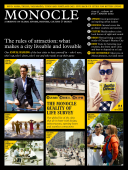
Issue 55
Issue 55 presents the Quality of Life Survey. We bring you 25 places to call home, 11 urban visionaries, 50 things to improve your life, five cities you’ll be hearing more about and one perfect street – as imagined by Monocle.
In This Issue
Oops! No content was found.
Looks like we no longer have content for the page you're on. Perhaps try a search?
Return Home

